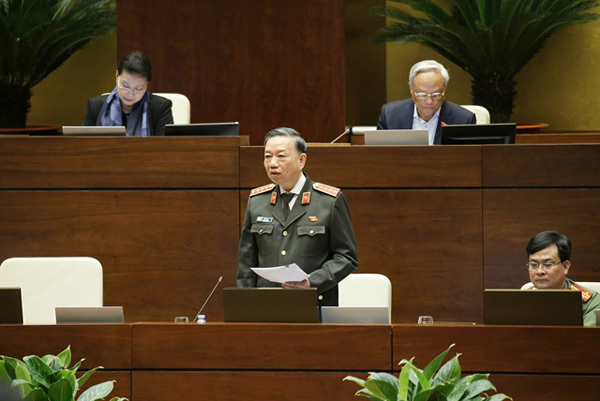In the morning, Hoang Thanh Tung, member of the NA Standing Committee and Chairman of the NA’s Committee for Legal Affairs, delivered a report on amendments to the draft revised law on administration violations settlement.
The amended contents include principles to settle administration violations, specific competence in administration violations settlement, maximum fine of violations, and making minutes of violations.
In the afternoon, legislators will scrutinise a draft Law on International Agreement after hearing Nguyen Van Giau, member of the NA Standing Committee and Chairman of the NA’s Committee for External Relations report on revised draft.
The law project was discussed at the 46th meeting of the NA Standing Committee’s 9th session.
Several contents of the revised bill comprise concept of international agreements, language of the agreements, signing of international agreements, state management agencies of international agreements, and instruction on the signing and implementation of the agreements, among others.
NA deputies mull Law on Residence
Most deputies agreed on the need to replace the manual method of residence management by household registration book and temporary residence certificate to e-management at a National Assembly discussion yesterday.
 |
| Minister of Public Security To Lam speaks at the ongoing National Assembly’s 10th sitting on Wednesday. VNA/VNS Photo Doan Tan |
They also agreed with the Government’s proposal that the amended Law on Residency would take effect on July 1 next year.
However, many deputies suggested there should be regulations to ensure the readiness of State agencies, avoiding causing problems for residents.
They proposed household registration books and temporary residence certificates continue to be used until December 31, 2022, to show information about the place of residence.
The deputies said the replacement to a new model of management was urgent and should be implemented from the time the law takes effect, but in the early stages when connections between ministries, agencies and localities with the National Database on Population and Database on Residence were not yet completed, people still need certain papers to verify their place of residence.
Allowing people to continue using these papers would help prevent causing difficulties for people while easing the pressure on management agencies when the law becomes effective, they said.
Tran Thi Dung, a deputy from the northern province of Dien Bien, said the use of citizens’ personal identification to update information on the National Database on Population was a progressive trend and a goal many countries in the world aim for.
However, she said, it was necessary to consider carefully because household registration and residence books were related to people’s daily life and the activities of agencies and organisations.
According to the Government’s plan, the connection and sharing of information and databases with all ministries and local branches will not have been completed by 2025, she said.
“It is impossible to ensure the efficiency of the national database by July 1, 2021,” Dung said.
Nguyen Thi Lan, a deputy from Hanoi, said the revised law would simplify procedures and paperwork in residency work by abolishing part or all of 13 groups of administrative procedures relating to permanent and temporary registration.
The change would help people and be relevant to the trend of administrative reform, she said.
Lan shared her concern it may be too late if the replacement was only applied by December 31, 2022.
“The country will not be able to keep up with international integration and the transformation of the technological revolution as well as its economic development,” she said.
The deputy proposed the Government and the Ministry of Public Security review manpower and resources to determine the appropriate timing to ensure the feasibility of the law.
Addressing the discussion, Minister of Public Security To Lam said the abolishment of household registration book was the people’s desire.
“Changing management methods would bring change and excitement for the people,” he said.
Lam said more than 90 per cent of the national database has so far been collected, verified and put into the system with a target that management methods related to the household registration book and citizen identification will be deployed by July 1 next year.
He said that there would be regulations relating to the transition period before the Law on Residency takes effect, adding that the compiling committee had a roadmap and determination to implement the law shortly. VNS/VNA

Draft bill proposes easing requirements for residency in major cities
The need to have extra requirements for people when applying for regular residency in cities affiliated to the central Government, also known as centrally-run cities like Hanoi or HCM City,

NA deputies discuss Law on Residency
Members of the National Assembly on Saturday had an online discussion on the piloting of the urban administration model in Da Nang, and a report on the revised law on residence.